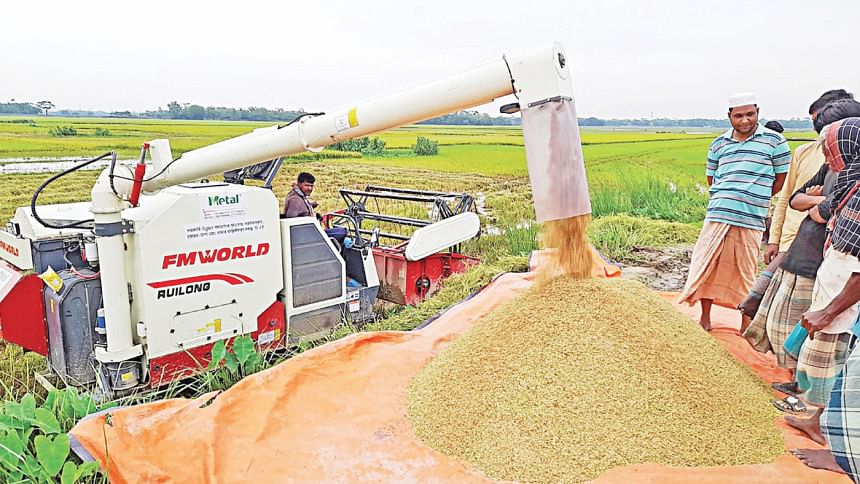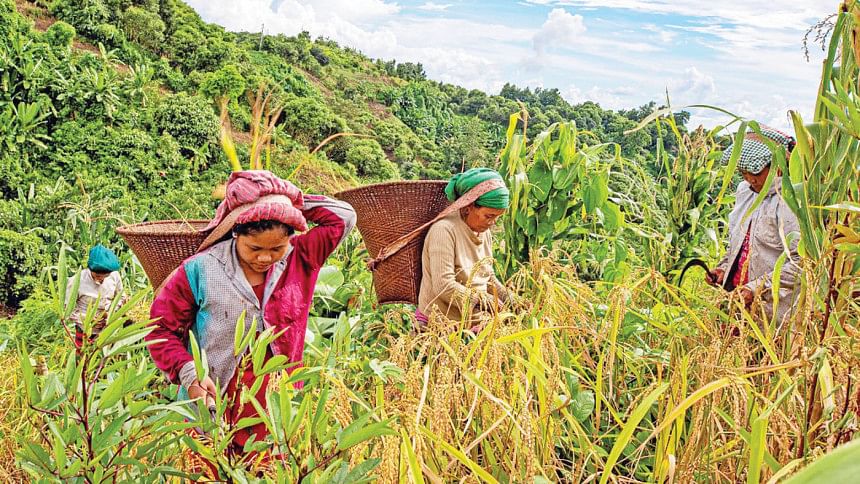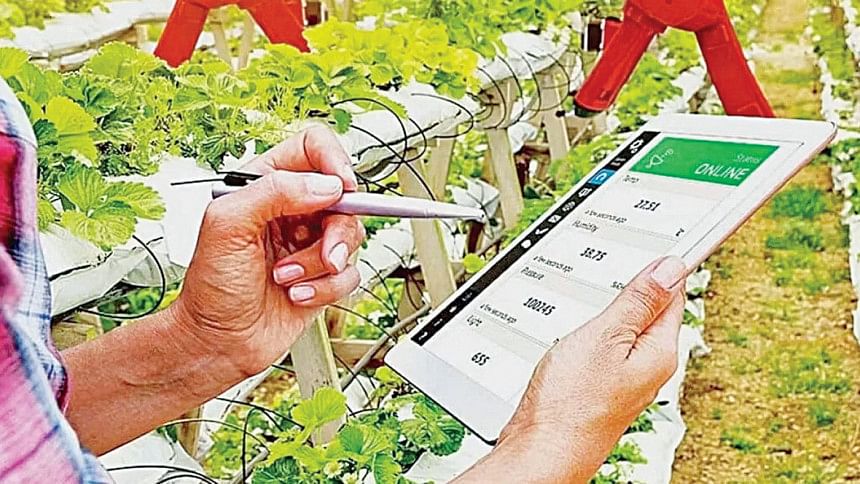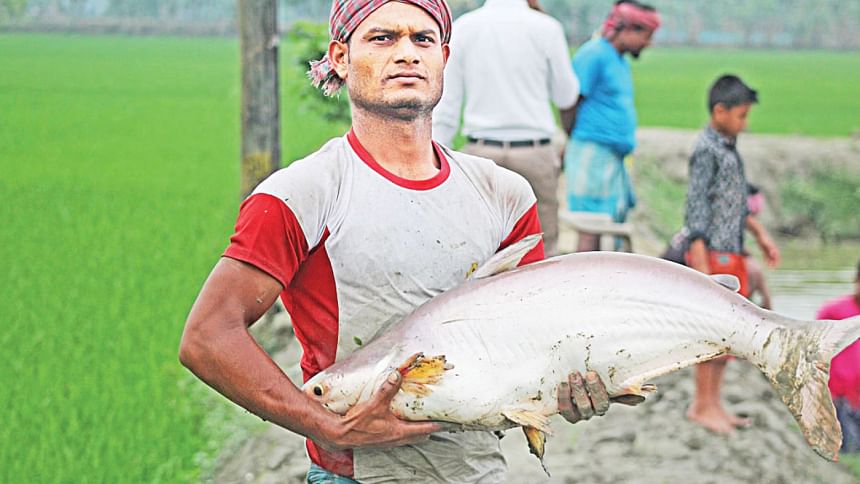Our journey towards a smart revolution in agriculture

Over the past 52 years, Bangladesh has achieved remarkable progress in the agricultural sector, thanks to the hard work and innovation of millions of small farmers, researchers, innovators and government support. The country has become self-sufficient in rice production, quadrupling its output, and has also made great strides in vegetable production, fruits, fish, meat, milk and egg. Bangladesh's agricultural sector is currently transforming due to urbanisation, economic growth, and increased demand for safe and nutritious food. There are vast opportunities in crops, horticulture, livestock, aquaculture, and more, including increased production, better processing, stress-resistant crops, and good agricultural practices.
We must leverage data-driven solutions and technologies to access local, regional, and international markets, and the potential is well recognised. We cannot afford to ignore the urgent need for knowledge cooperation to use smart agricultural technologies, which must be implemented. However, Bangladesh also faces climatic challenges, which have renewed the country's focus on revitalising and improving the capacity of agriculture. There is significant potential for agricultural diversification, but meeting the challenges will require effort and investment. We must prioritise increased productivity and commercialisation of agriculture to promote overall growth and reduce poverty. It is therefore increasingly urgent to introduce climate solutions in the sector and address ongoing challenges such as low productivity and sustainability due to climate change, post-harvest loss, low-value addition, and very few food storage systems. Climate-smart technology is another significant tool for prioritisation.
Bangladesh benefits and suffers from one of the most extensive river systems in the world, with a large delta. During the monsoon season, 55-60 percent of the land is submerged in water, and during the dry season, there is very little water. Bangladesh's coastal areas are prone to cyclones, typhoons, and sea-level rise. Water resource management is critical to support the agriculture system, as well as supporting vulnerable rural communities. Flood control, drainage, irrigation, water supply, and integrated water management are the key areas of water resource management. We must prioritise disaster risk management, conservation, and cooperation with Bangladesh's riverine neighbours (India, Nepal, Bhutan, Myanmar, and China) as strategic priorities.

Over the past three decades, agriculture has benefited from significant investments in flood control, drainage, and irrigation projects, mainly using surface water for irrigation. However, we must acknowledge that the sustainability of these investments has been weak. The Bangladesh Delta Plan 2100 and the Eighth five-year plan (2020-2025) focus on accelerating agricultural commercialisation to provide sustainable, safe, and diversified food products. We must support the sustainable expansion and diversification of climate-resilient agricultural production systems, which are better integrated with global and local markets, to provide food and nutrition security, as well as improve rural livelihoods, especially for women and vulnerable communities. Strategy for water resources management emphasises the need to improve irrigation efficiencies and water productivity to ensure optimal water use, reduce vulnerability, and ensure the availability of water for economic purposes and hygiene, and to protect aquatic and water-dependent ecosystems. The strategy also emphasises institutional reform of the water sector agencies to achieve effective, integrated, and sustainable water management, with sustainable operation and maintenance. Finally, we must emphasise the inclusive participation of all stakeholders to achieve our goals.
The agro-food processing industry in the country relies heavily on agricultural products and is characterised by its diverse range of sizes, technologies, product qualities, processing methods, preservation techniques, and marketing and distribution systems. This sector contributes to more than 22 percent of the country's manufacturing production, employs approximately 20 percent of the labour force, and accounts for about 2 percent of the GDP (MoI, 2012). In recent years, Bangladesh's agricultural industry has been increasingly focusing on expanding its presence in exports markets.
Within the country, there are nearly 700 food processing enterprises, including small-scale homemade processing units. Among these, at least 30 enterprises specialise in processing fruits and vegetables. The food processing sector encompasses a wide range of products, including cereals, pulses and oilseeds, bakery and confectionery items, fruits and vegetables, dairy products, carbonated and non-carbonated beverages, fruit juices, and various other food items. Bangladesh itself has a significant domestic market for processed food products. The Bangladesh Agro-Processors' Association (BAPA) currently has 479 members, consisting of 244 exporters and 235 manufacturers of agro-processing products.

In the fiscal year 2021-22, Bangladesh witnessed a remarkable growth in its export of agricultural-industrial products. The value of these exports reached an impressive Tk 282.3 billion, marking a significant increase of 272 percent compared to Tk 75.8 billion in 2006-07. This export category encompassed a diverse range of live/frozen and dried products from the fisheries and agriculture sectors, as well as jute and jute goods. Notably, jute and jute goods dominated the export consignments, with a value of Tk 112.8 billion in 2021-22, reflecting a substantial growth of 278 percent from Tk 29.9 billion in 2006-07. The crop sector played a pivotal role in this export surge, contributing an array of products such as potatoes, vegetables, pulses, oilseeds, spices, fruits, tea, nuts, seeds, tobacco, and dry foods. The export value of agriculture products witnessed a staggering increase of 2,892 percent from Tk 3.9 billion in 2006-07 to Tk 116.2 billion in 2021-22, making a significant contribution to the sectoral income. On the other hand, the export of fish products remained relatively stable throughout these years, with a marginal increase from Tk 42.1 billion in 2006-07 to Tk 53.3 billion in 2021-22. Despite this, the overall growth in Bangladesh's agricultural-industrial exports showcases the country's potential and success in this sector.
The advancements brought about by the Fourth Industrial Revolution (4IR) have the potential to greatly impact Bangladesh's progress in the 21st century. With the rapid development of computing power, connectivity, artificial intelligence, robotics, and other advanced technologies, there is significant opportunity for these innovations to revolutionise the agricultural sector, as the implementation of the "Digital Bangladesh" programme aims to transform the rural economy and generate employment opportunities for skilled individuals in rural areas.
Through the implementation of 4IR, a smart farming culture can be established to drive productivity in agriculture through competitive means. The utilisation of agricultural robotics technology in 4IR yields favourable outcomes, including the reduction of labour costs and the enhancement of advanced agricultural systems' quality. Farmers get access to the internet, web, and online platforms, enabling them to stay informed about the latest field information via their mobile phones. These devices are connected to IoT devices and cloud computing, providing farmers with real-time updates on light, temperature, humidity, and soil moisture in their fields through connected sensors.
Bangladesh has emerged as the 35th largest economy globally. In its early years as an independent nation in 1971, Bangladesh faced a substantial food deficit. However, the visionary leader, Bangabandhu Sheikh Mujibur Rahman, recognised the crucial role of agriculture and implemented bold initiatives to propel the concept of the green revolution for agricultural progress, which is still carried out by the government of Bangladesh. The country has now emerged as one of the leading producers globally in various agricultural sectors. It has secured a position among the top 10 producers of rice, jute, jackfruit, mango, onion, tea, vegetables, potato, and farm fish. This achievement highlights the country's significant contribution to the global market in terms of these essential commodities.

Furthermore, there has been a notable increase in per capita consumption of fish, meat, and milk, indicating a diversification in the diet of the population. This shift towards a more varied diet is a positive development for nutrition. However, it is crucial to address the challenges that Bangladesh faces in terms of its natural resources. The degradation of soil, water, and forests poses a threat to sustainable agriculture. Additionally, the shrinking arable land and the negative impacts of climate change further exacerbate these concerns. Ensuring nutrition security for marginal and rural populations is of utmost importance, especially in the face of increasing urbanisation and significant changes in food habits due to higher purchasing power.
Moreover, with the ever-increasing population, there is a growing demand for more food production that is both nutritious and safe. In light of these circumstances, Bangladesh must prioritise sustainable agricultural practices and invest in research and development to meet the growing food demands of its population. It is essential to strike a balance between agricultural productivity and environmental conservation to ensure a secure and sustainable future for the country.
There are some key focus points, which I must mention briefly:
a) Focus on enhanced productivity and higher efficiency in farming, using upgraded strategies, processes and tools.
b) Restructuring current pricing, storage and distribution aimed at reducing costs and ensuring availability at affordable prices.
c) Protection of farmers' interests as producers and suppliers.
d) Upgrade crop insurance and medical insurance as well as introduce a global format of farmers' pension scheme.
e) Current safety net and social protection should focus on access to affordable food.
f) Focus on advanced agricultural research.
g) Strategic framework for private sector investment and engagement in the agriculture sector.
h) Legal requirements to ensure the protection of agricultural land and farming resources.
i) Tax incentives and fiscal stimulus for agricultural products.
j) Decentralisation of key national agricultural institutions.
In the 1960s came the green revolution, and now is the best time for another revolution which has to be smart and efficient. Together, we can walk the way towards better sustainability. The smart revolution will bring about a complete change in the scenario that we are looking at now. It will not only strengthen the sector but will effectively change our livelihood. This will let us eradicate poverty and inequality, both of which are man-made. This can be undone by smart farming technologies. There is potential in everyone and people need to realise that. We know change only happens when vision meets with action. Whenever agriculture is faced with urgent challenges, it deserves urgent solutions. Yes, indeed, we do not know every solution; but our farmers are always on the ground, listening, learning and evolving. The same goes with the government, policymakers, development partners and other stakeholders in the sector. Bangladesh is not only dreaming of a better farming sector, we are building it, brick by brick, stronger than ever and, of course, together.

 For all latest news, follow The Daily Star's Google News channel.
For all latest news, follow The Daily Star's Google News channel. 



Comments